Is there a moral case for meat? - English Assignment
VerifiedAdded on 2023/06/04
|6
|1445
|461
AI Summary
This thesis evaluates the moral justification of eating animal meat. It examines the arguments raised by various article writers such as Nathanael Johnson and Peter Singer. The thesis is based on the argument that animals have the right not to suffer. The article discusses the moral case against eating animal meat and the possibility of finding compelling prior claims on the other side of the domain. It also explores the interdependence between various species, human interrelationship linkage, and nature. Subject: English, Course Code: N/A, Course Name: N/A, College/University: N/A
Contribute Materials
Your contribution can guide someone’s learning journey. Share your
documents today.
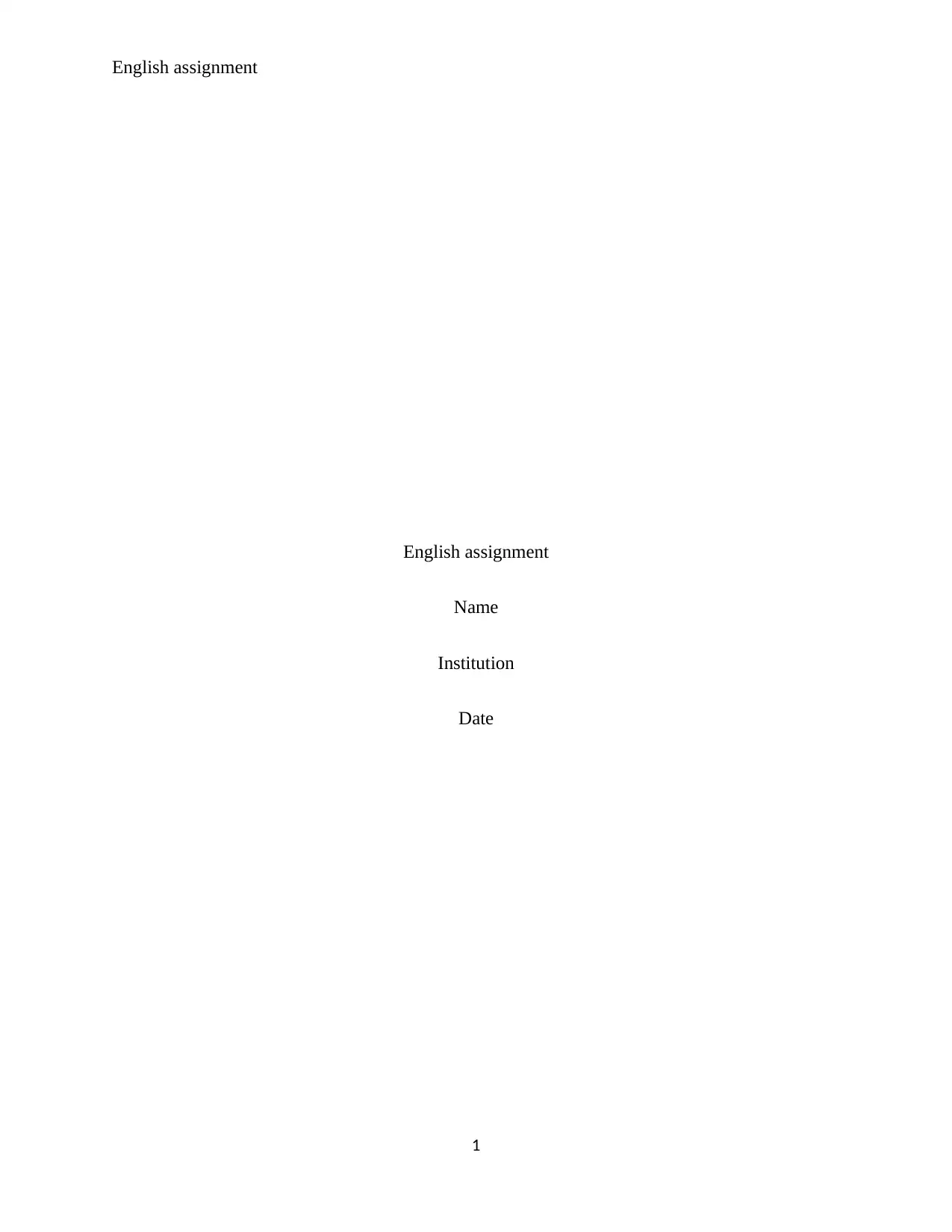
English assignment
English assignment
Name
Institution
Date
1
English assignment
Name
Institution
Date
1
Secure Best Marks with AI Grader
Need help grading? Try our AI Grader for instant feedback on your assignments.
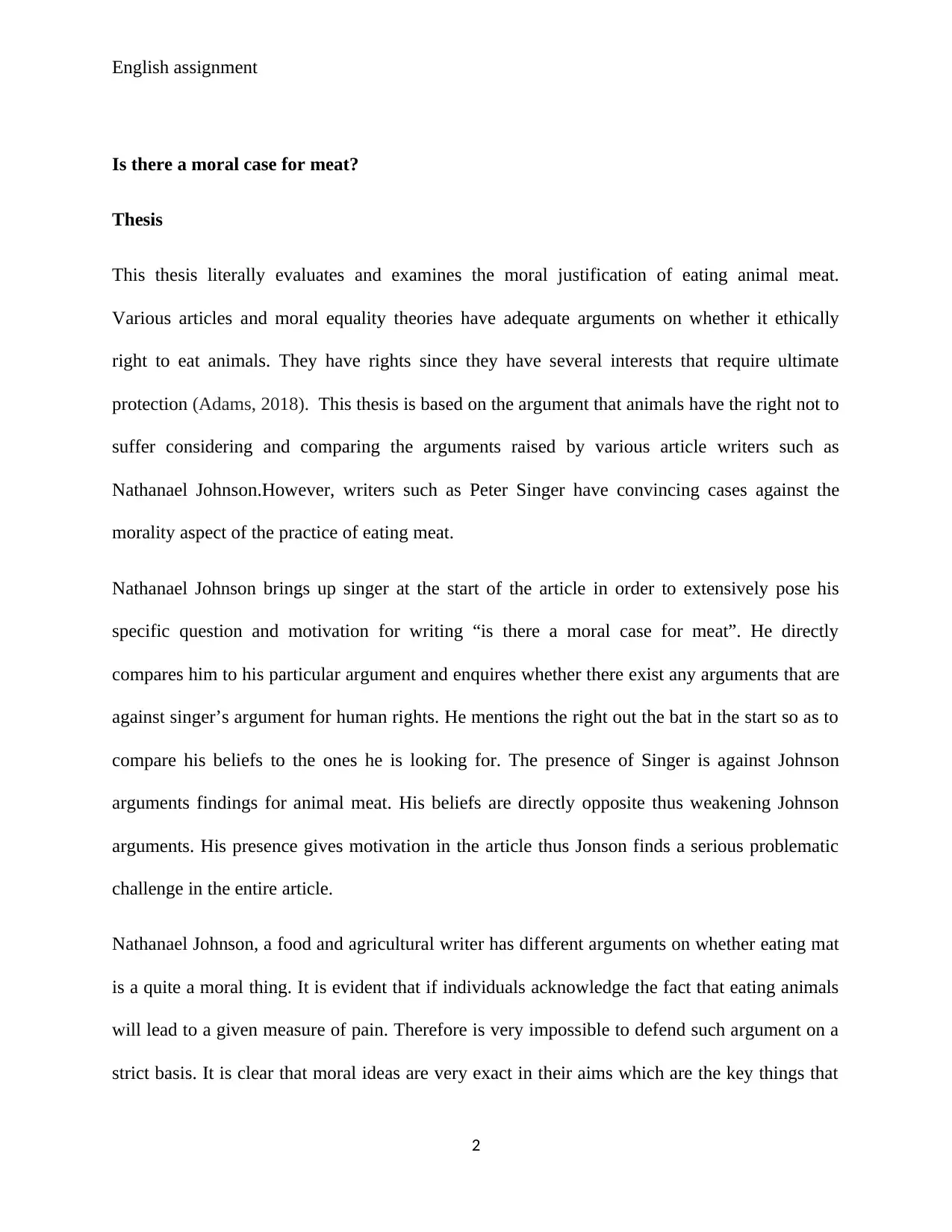
English assignment
Is there a moral case for meat?
Thesis
This thesis literally evaluates and examines the moral justification of eating animal meat.
Various articles and moral equality theories have adequate arguments on whether it ethically
right to eat animals. They have rights since they have several interests that require ultimate
protection (Adams, 2018). This thesis is based on the argument that animals have the right not to
suffer considering and comparing the arguments raised by various article writers such as
Nathanael Johnson.However, writers such as Peter Singer have convincing cases against the
morality aspect of the practice of eating meat.
Nathanael Johnson brings up singer at the start of the article in order to extensively pose his
specific question and motivation for writing “is there a moral case for meat”. He directly
compares him to his particular argument and enquires whether there exist any arguments that are
against singer’s argument for human rights. He mentions the right out the bat in the start so as to
compare his beliefs to the ones he is looking for. The presence of Singer is against Johnson
arguments findings for animal meat. His beliefs are directly opposite thus weakening Johnson
arguments. His presence gives motivation in the article thus Jonson finds a serious problematic
challenge in the entire article.
Nathanael Johnson, a food and agricultural writer has different arguments on whether eating mat
is a quite a moral thing. It is evident that if individuals acknowledge the fact that eating animals
will lead to a given measure of pain. Therefore is very impossible to defend such argument on a
strict basis. It is clear that moral ideas are very exact in their aims which are the key things that
2
Is there a moral case for meat?
Thesis
This thesis literally evaluates and examines the moral justification of eating animal meat.
Various articles and moral equality theories have adequate arguments on whether it ethically
right to eat animals. They have rights since they have several interests that require ultimate
protection (Adams, 2018). This thesis is based on the argument that animals have the right not to
suffer considering and comparing the arguments raised by various article writers such as
Nathanael Johnson.However, writers such as Peter Singer have convincing cases against the
morality aspect of the practice of eating meat.
Nathanael Johnson brings up singer at the start of the article in order to extensively pose his
specific question and motivation for writing “is there a moral case for meat”. He directly
compares him to his particular argument and enquires whether there exist any arguments that are
against singer’s argument for human rights. He mentions the right out the bat in the start so as to
compare his beliefs to the ones he is looking for. The presence of Singer is against Johnson
arguments findings for animal meat. His beliefs are directly opposite thus weakening Johnson
arguments. His presence gives motivation in the article thus Jonson finds a serious problematic
challenge in the entire article.
Nathanael Johnson, a food and agricultural writer has different arguments on whether eating mat
is a quite a moral thing. It is evident that if individuals acknowledge the fact that eating animals
will lead to a given measure of pain. Therefore is very impossible to defend such argument on a
strict basis. It is clear that moral ideas are very exact in their aims which are the key things that
2
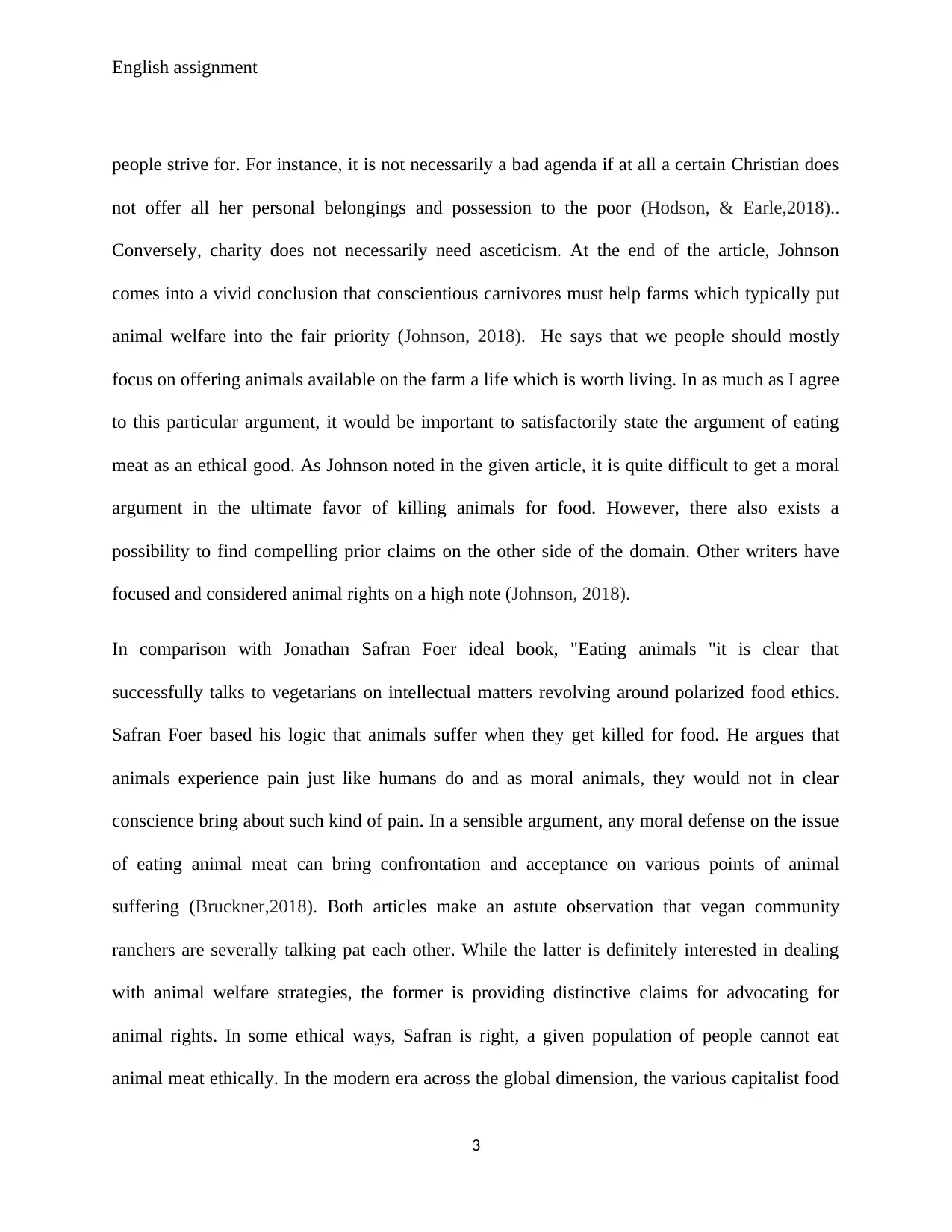
English assignment
people strive for. For instance, it is not necessarily a bad agenda if at all a certain Christian does
not offer all her personal belongings and possession to the poor (Hodson, & Earle,2018)..
Conversely, charity does not necessarily need asceticism. At the end of the article, Johnson
comes into a vivid conclusion that conscientious carnivores must help farms which typically put
animal welfare into the fair priority (Johnson, 2018). He says that we people should mostly
focus on offering animals available on the farm a life which is worth living. In as much as I agree
to this particular argument, it would be important to satisfactorily state the argument of eating
meat as an ethical good. As Johnson noted in the given article, it is quite difficult to get a moral
argument in the ultimate favor of killing animals for food. However, there also exists a
possibility to find compelling prior claims on the other side of the domain. Other writers have
focused and considered animal rights on a high note (Johnson, 2018).
In comparison with Jonathan Safran Foer ideal book, "Eating animals "it is clear that
successfully talks to vegetarians on intellectual matters revolving around polarized food ethics.
Safran Foer based his logic that animals suffer when they get killed for food. He argues that
animals experience pain just like humans do and as moral animals, they would not in clear
conscience bring about such kind of pain. In a sensible argument, any moral defense on the issue
of eating animal meat can bring confrontation and acceptance on various points of animal
suffering (Bruckner,2018). Both articles make an astute observation that vegan community
ranchers are severally talking pat each other. While the latter is definitely interested in dealing
with animal welfare strategies, the former is providing distinctive claims for advocating for
animal rights. In some ethical ways, Safran is right, a given population of people cannot eat
animal meat ethically. In the modern era across the global dimension, the various capitalist food
3
people strive for. For instance, it is not necessarily a bad agenda if at all a certain Christian does
not offer all her personal belongings and possession to the poor (Hodson, & Earle,2018)..
Conversely, charity does not necessarily need asceticism. At the end of the article, Johnson
comes into a vivid conclusion that conscientious carnivores must help farms which typically put
animal welfare into the fair priority (Johnson, 2018). He says that we people should mostly
focus on offering animals available on the farm a life which is worth living. In as much as I agree
to this particular argument, it would be important to satisfactorily state the argument of eating
meat as an ethical good. As Johnson noted in the given article, it is quite difficult to get a moral
argument in the ultimate favor of killing animals for food. However, there also exists a
possibility to find compelling prior claims on the other side of the domain. Other writers have
focused and considered animal rights on a high note (Johnson, 2018).
In comparison with Jonathan Safran Foer ideal book, "Eating animals "it is clear that
successfully talks to vegetarians on intellectual matters revolving around polarized food ethics.
Safran Foer based his logic that animals suffer when they get killed for food. He argues that
animals experience pain just like humans do and as moral animals, they would not in clear
conscience bring about such kind of pain. In a sensible argument, any moral defense on the issue
of eating animal meat can bring confrontation and acceptance on various points of animal
suffering (Bruckner,2018). Both articles make an astute observation that vegan community
ranchers are severally talking pat each other. While the latter is definitely interested in dealing
with animal welfare strategies, the former is providing distinctive claims for advocating for
animal rights. In some ethical ways, Safran is right, a given population of people cannot eat
animal meat ethically. In the modern era across the global dimension, the various capitalist food
3
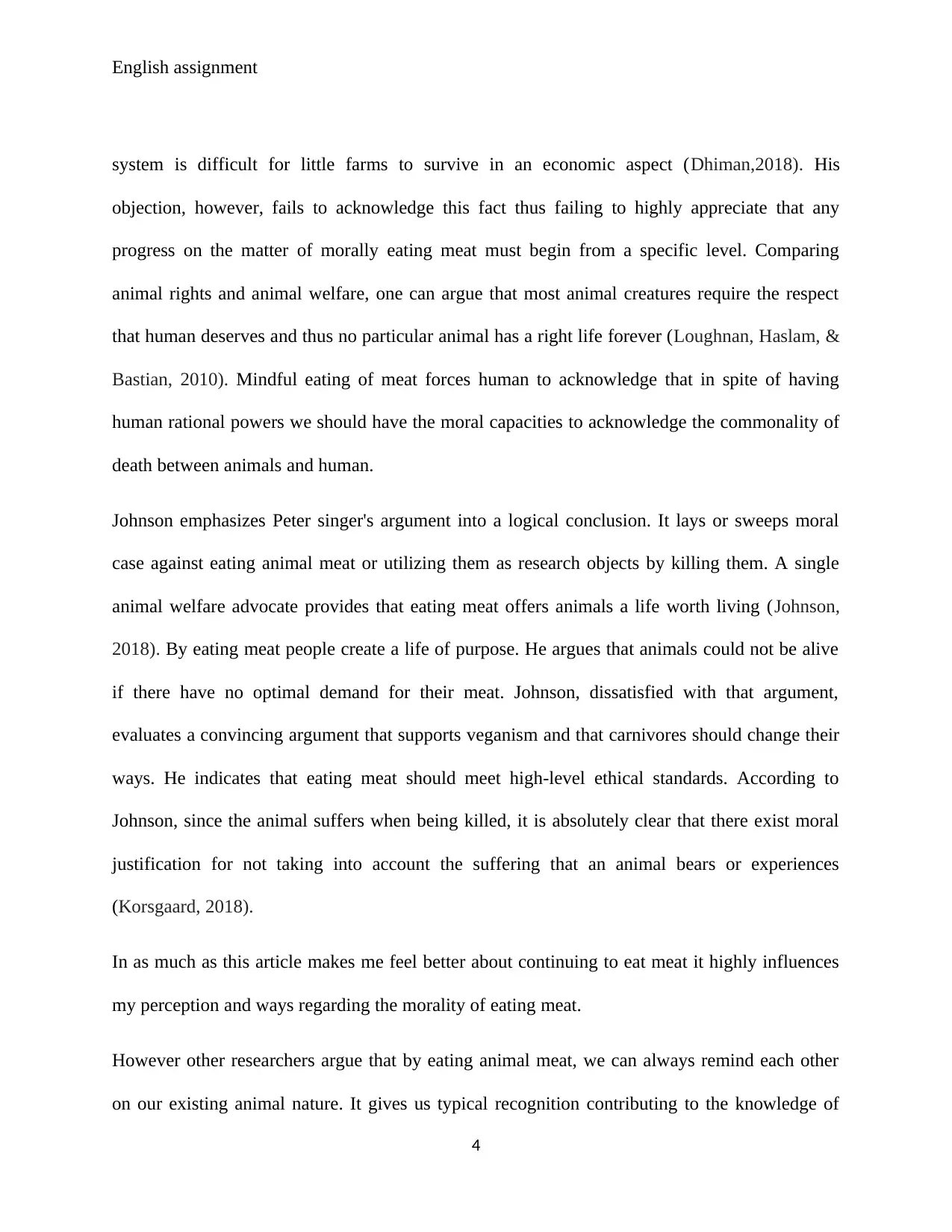
English assignment
system is difficult for little farms to survive in an economic aspect (Dhiman,2018). His
objection, however, fails to acknowledge this fact thus failing to highly appreciate that any
progress on the matter of morally eating meat must begin from a specific level. Comparing
animal rights and animal welfare, one can argue that most animal creatures require the respect
that human deserves and thus no particular animal has a right life forever (Loughnan, Haslam, &
Bastian, 2010). Mindful eating of meat forces human to acknowledge that in spite of having
human rational powers we should have the moral capacities to acknowledge the commonality of
death between animals and human.
Johnson emphasizes Peter singer's argument into a logical conclusion. It lays or sweeps moral
case against eating animal meat or utilizing them as research objects by killing them. A single
animal welfare advocate provides that eating meat offers animals a life worth living (Johnson,
2018). By eating meat people create a life of purpose. He argues that animals could not be alive
if there have no optimal demand for their meat. Johnson, dissatisfied with that argument,
evaluates a convincing argument that supports veganism and that carnivores should change their
ways. He indicates that eating meat should meet high-level ethical standards. According to
Johnson, since the animal suffers when being killed, it is absolutely clear that there exist moral
justification for not taking into account the suffering that an animal bears or experiences
(Korsgaard, 2018).
In as much as this article makes me feel better about continuing to eat meat it highly influences
my perception and ways regarding the morality of eating meat.
However other researchers argue that by eating animal meat, we can always remind each other
on our existing animal nature. It gives us typical recognition contributing to the knowledge of
4
system is difficult for little farms to survive in an economic aspect (Dhiman,2018). His
objection, however, fails to acknowledge this fact thus failing to highly appreciate that any
progress on the matter of morally eating meat must begin from a specific level. Comparing
animal rights and animal welfare, one can argue that most animal creatures require the respect
that human deserves and thus no particular animal has a right life forever (Loughnan, Haslam, &
Bastian, 2010). Mindful eating of meat forces human to acknowledge that in spite of having
human rational powers we should have the moral capacities to acknowledge the commonality of
death between animals and human.
Johnson emphasizes Peter singer's argument into a logical conclusion. It lays or sweeps moral
case against eating animal meat or utilizing them as research objects by killing them. A single
animal welfare advocate provides that eating meat offers animals a life worth living (Johnson,
2018). By eating meat people create a life of purpose. He argues that animals could not be alive
if there have no optimal demand for their meat. Johnson, dissatisfied with that argument,
evaluates a convincing argument that supports veganism and that carnivores should change their
ways. He indicates that eating meat should meet high-level ethical standards. According to
Johnson, since the animal suffers when being killed, it is absolutely clear that there exist moral
justification for not taking into account the suffering that an animal bears or experiences
(Korsgaard, 2018).
In as much as this article makes me feel better about continuing to eat meat it highly influences
my perception and ways regarding the morality of eating meat.
However other researchers argue that by eating animal meat, we can always remind each other
on our existing animal nature. It gives us typical recognition contributing to the knowledge of
4
Secure Best Marks with AI Grader
Need help grading? Try our AI Grader for instant feedback on your assignments.
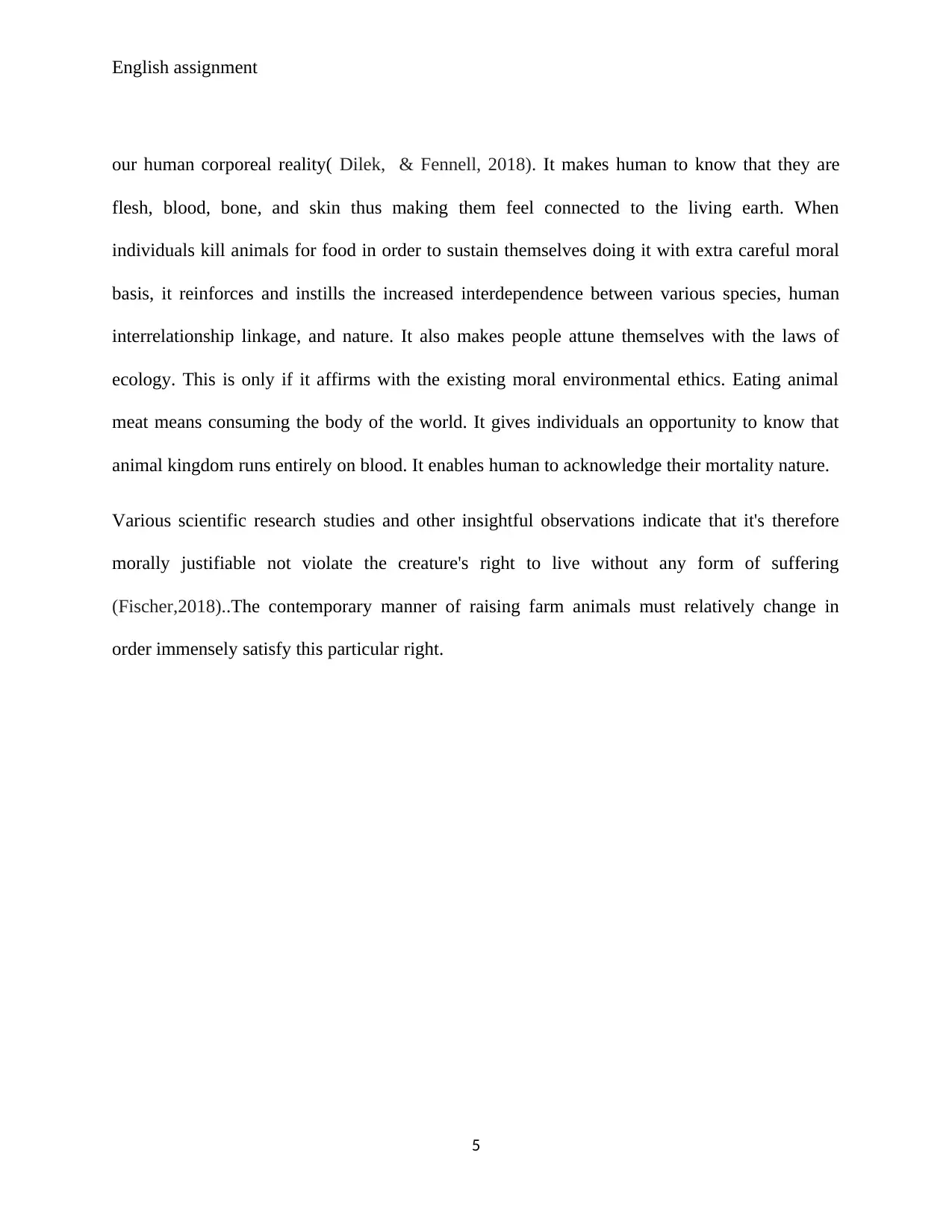
English assignment
our human corporeal reality( Dilek, & Fennell, 2018). It makes human to know that they are
flesh, blood, bone, and skin thus making them feel connected to the living earth. When
individuals kill animals for food in order to sustain themselves doing it with extra careful moral
basis, it reinforces and instills the increased interdependence between various species, human
interrelationship linkage, and nature. It also makes people attune themselves with the laws of
ecology. This is only if it affirms with the existing moral environmental ethics. Eating animal
meat means consuming the body of the world. It gives individuals an opportunity to know that
animal kingdom runs entirely on blood. It enables human to acknowledge their mortality nature.
Various scientific research studies and other insightful observations indicate that it's therefore
morally justifiable not violate the creature's right to live without any form of suffering
(Fischer,2018)..The contemporary manner of raising farm animals must relatively change in
order immensely satisfy this particular right.
5
our human corporeal reality( Dilek, & Fennell, 2018). It makes human to know that they are
flesh, blood, bone, and skin thus making them feel connected to the living earth. When
individuals kill animals for food in order to sustain themselves doing it with extra careful moral
basis, it reinforces and instills the increased interdependence between various species, human
interrelationship linkage, and nature. It also makes people attune themselves with the laws of
ecology. This is only if it affirms with the existing moral environmental ethics. Eating animal
meat means consuming the body of the world. It gives individuals an opportunity to know that
animal kingdom runs entirely on blood. It enables human to acknowledge their mortality nature.
Various scientific research studies and other insightful observations indicate that it's therefore
morally justifiable not violate the creature's right to live without any form of suffering
(Fischer,2018)..The contemporary manner of raising farm animals must relatively change in
order immensely satisfy this particular right.
5
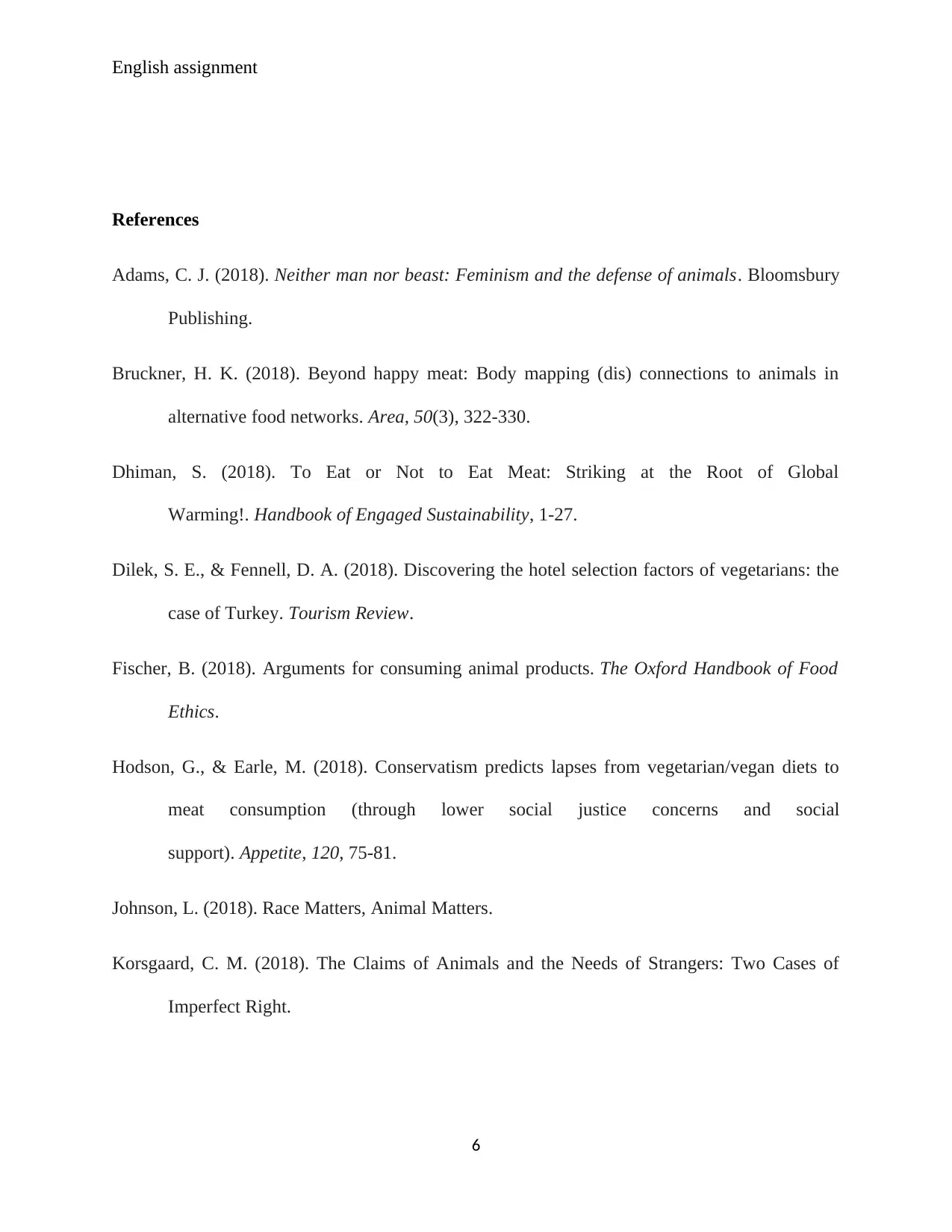
English assignment
References
Adams, C. J. (2018). Neither man nor beast: Feminism and the defense of animals. Bloomsbury
Publishing.
Bruckner, H. K. (2018). Beyond happy meat: Body mapping (dis) connections to animals in
alternative food networks. Area, 50(3), 322-330.
Dhiman, S. (2018). To Eat or Not to Eat Meat: Striking at the Root of Global
Warming!. Handbook of Engaged Sustainability, 1-27.
Dilek, S. E., & Fennell, D. A. (2018). Discovering the hotel selection factors of vegetarians: the
case of Turkey. Tourism Review.
Fischer, B. (2018). Arguments for consuming animal products. The Oxford Handbook of Food
Ethics.
Hodson, G., & Earle, M. (2018). Conservatism predicts lapses from vegetarian/vegan diets to
meat consumption (through lower social justice concerns and social
support). Appetite, 120, 75-81.
Johnson, L. (2018). Race Matters, Animal Matters.
Korsgaard, C. M. (2018). The Claims of Animals and the Needs of Strangers: Two Cases of
Imperfect Right.
6
References
Adams, C. J. (2018). Neither man nor beast: Feminism and the defense of animals. Bloomsbury
Publishing.
Bruckner, H. K. (2018). Beyond happy meat: Body mapping (dis) connections to animals in
alternative food networks. Area, 50(3), 322-330.
Dhiman, S. (2018). To Eat or Not to Eat Meat: Striking at the Root of Global
Warming!. Handbook of Engaged Sustainability, 1-27.
Dilek, S. E., & Fennell, D. A. (2018). Discovering the hotel selection factors of vegetarians: the
case of Turkey. Tourism Review.
Fischer, B. (2018). Arguments for consuming animal products. The Oxford Handbook of Food
Ethics.
Hodson, G., & Earle, M. (2018). Conservatism predicts lapses from vegetarian/vegan diets to
meat consumption (through lower social justice concerns and social
support). Appetite, 120, 75-81.
Johnson, L. (2018). Race Matters, Animal Matters.
Korsgaard, C. M. (2018). The Claims of Animals and the Needs of Strangers: Two Cases of
Imperfect Right.
6
1 out of 6
Your All-in-One AI-Powered Toolkit for Academic Success.
+13062052269
info@desklib.com
Available 24*7 on WhatsApp / Email
![[object Object]](/_next/static/media/star-bottom.7253800d.svg)
Unlock your academic potential
© 2024 | Zucol Services PVT LTD | All rights reserved.
